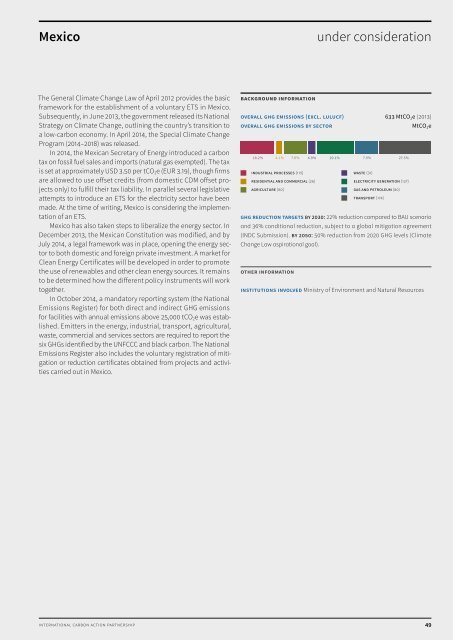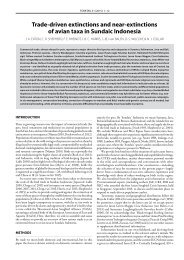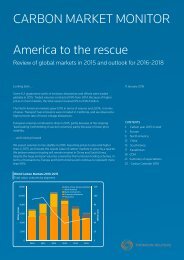Emissions Trading Worldwide
1TbjEHd
1TbjEHd
You also want an ePaper? Increase the reach of your titles
YUMPU automatically turns print PDFs into web optimized ePapers that Google loves.
Mexico<br />
under consideration<br />
The General Climate Change Law of April 2012 provides the basic<br />
framework for the establishment of a voluntary ETS in Mexico.<br />
Subsequently, in June 2013, the government released its National<br />
Strategy on Climate Change, outlining the country’s transition to<br />
a low-carbon economy. In April 2014, the Special Climate Change<br />
Program (2014–2018) was released.<br />
In 2014, the Mexican Secretary of Energy introduced a carbon<br />
tax on fossil fuel sales and imports (natural gas exempted). The tax<br />
is set at approximately USD 3.50 per tCO 2 e (EUR 3.19), though firms<br />
are allowed to use offset credits (from domestic CDM offset projects<br />
only) to fulfill their tax liability. In parallel several legislative<br />
attempts to introduce an ETS for the electricity sector have been<br />
made. At the time of writing, Mexico is considering the implementation<br />
of an ETS.<br />
Mexico has also taken steps to liberalize the energy sector. In<br />
December 2013, the Mexican Constitution was modified, and by<br />
July 2014, a legal framework was in place, opening the energy sector<br />
to both domestic and foreign private investment. A market for<br />
Clean Energy Certificates will be developed in order to promote<br />
the use of renewables and other clean energy sources. It remains<br />
to be determined how the different policy instruments will work<br />
together.<br />
In October 2014, a mandatory reporting system (the National<br />
<strong>Emissions</strong> Register) for both direct and indirect GHG emissions<br />
for facilities with annual emissions above 25,000 tCO 2 e was established.<br />
Emitters in the energy, industrial, transport, agricultural,<br />
waste, commercial and services sectors are required to report the<br />
six GHGs identified by the UNFCCC and black carbon. The National<br />
<strong>Emissions</strong> Register also includes the voluntary registration of mitigation<br />
or reduction certificates obtained from projects and activities<br />
carried out in Mexico.<br />
background information<br />
Overall Ghg <strong>Emissions</strong> (excl. LULUCF) 633 MtCO 2 e (2013)<br />
OVERALL GHG EMISSIONS BY SECTOR<br />
MtCO 2 e<br />
18.2 % 4.1 % 7.9 % 4.9 % 20.1 %<br />
7.9 %<br />
27.5 %<br />
Industrial processes (115)<br />
Residential and Commercial (26)<br />
Agriculture (80)<br />
waste (31)<br />
Electricity generation (127)<br />
Gas and Petroleum (80)<br />
Transport (174)<br />
GHG Reduction Targets By 2030: 22% reduction compared to BAU scenario<br />
and 36% conditional reduction, subject to a global mitigation agreement<br />
(INDC Submission). By 2050: 50% reduction from 2020 GHG levels (Climate<br />
Change Law aspirational goal).<br />
other information<br />
Institutions involved Ministry of Environment and Natural Resources<br />
international carbon action partnership<br />
49




